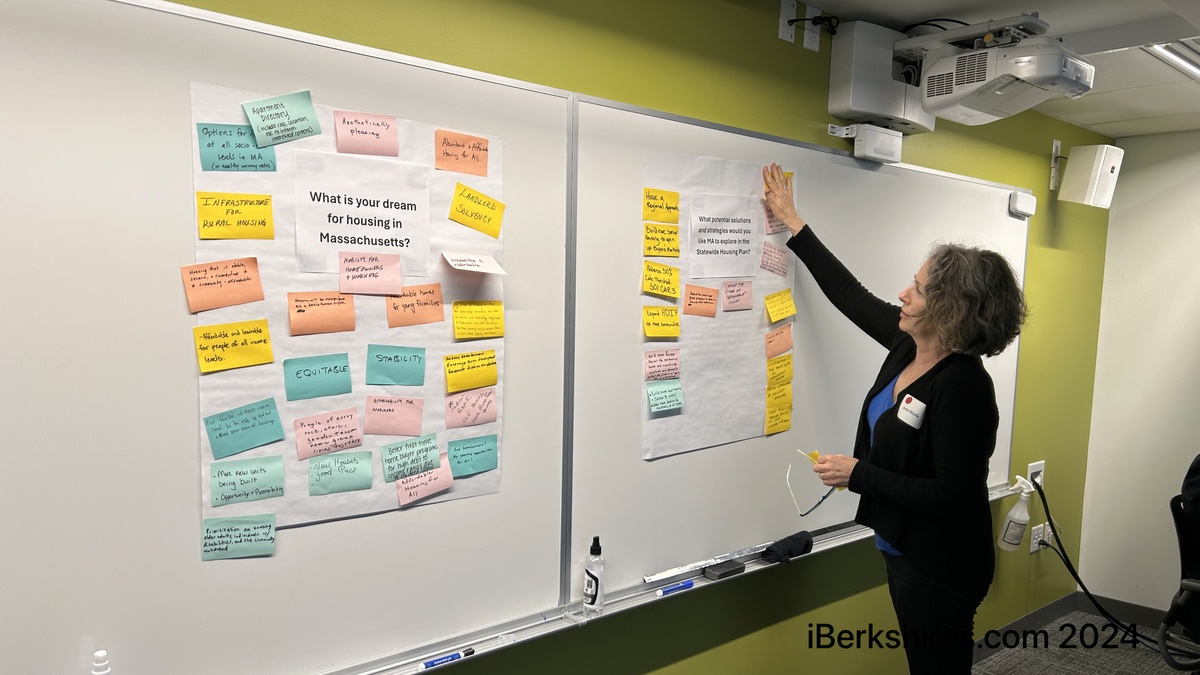
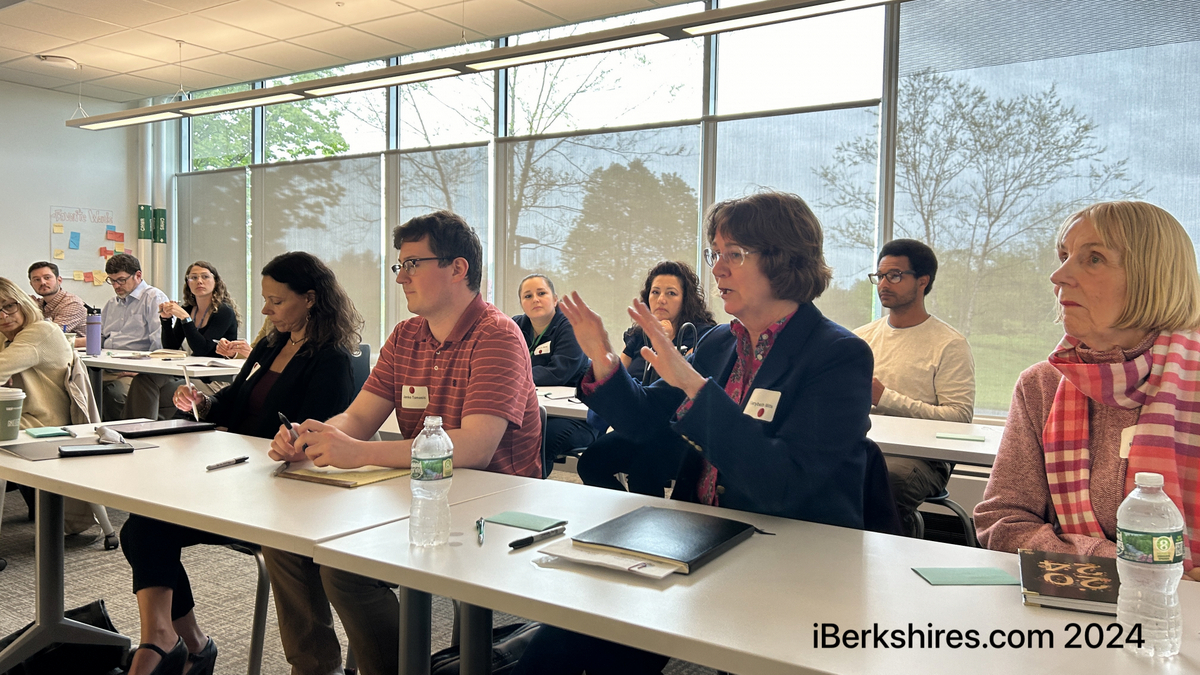
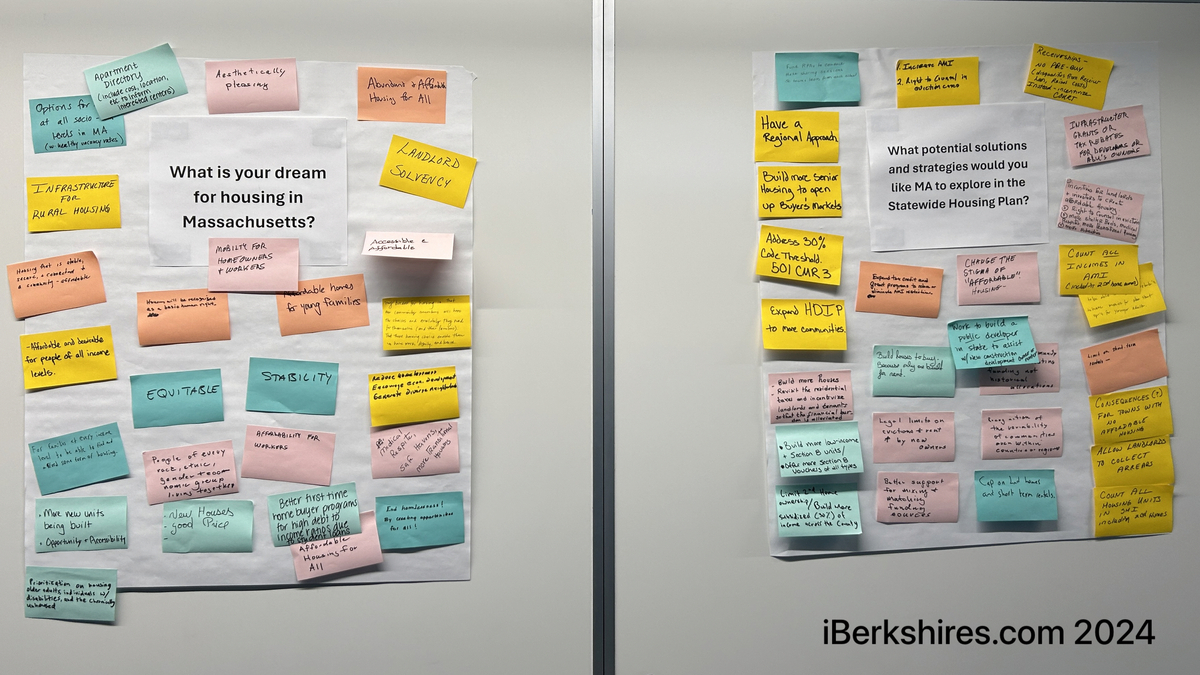
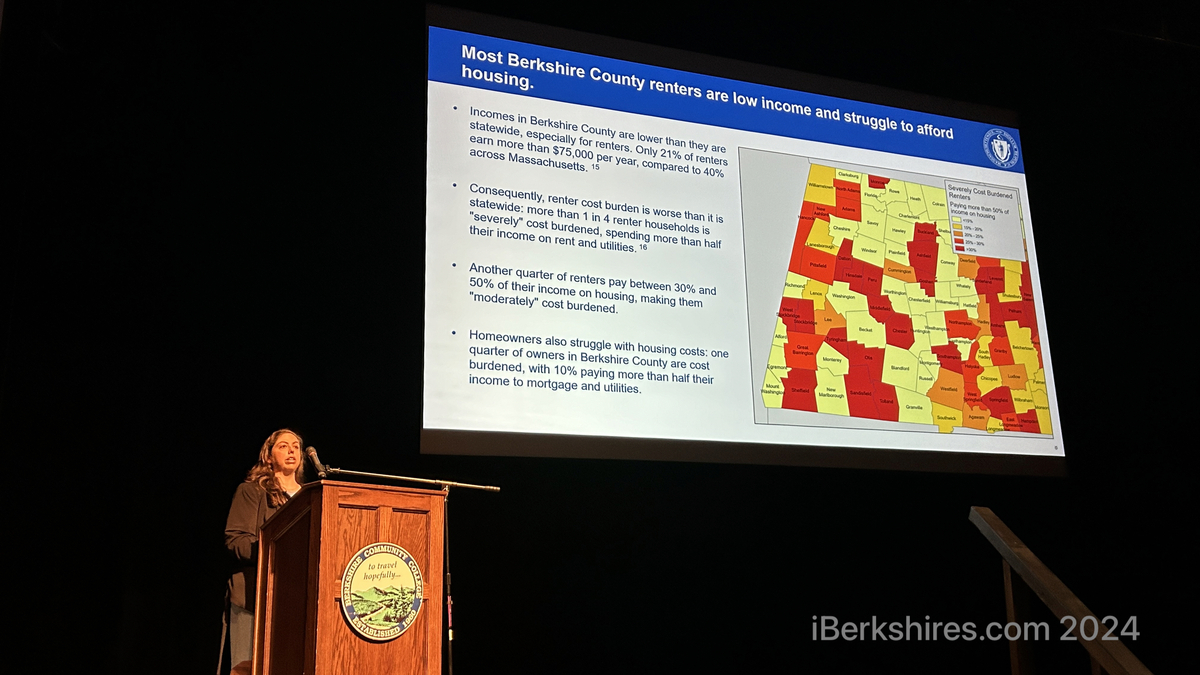
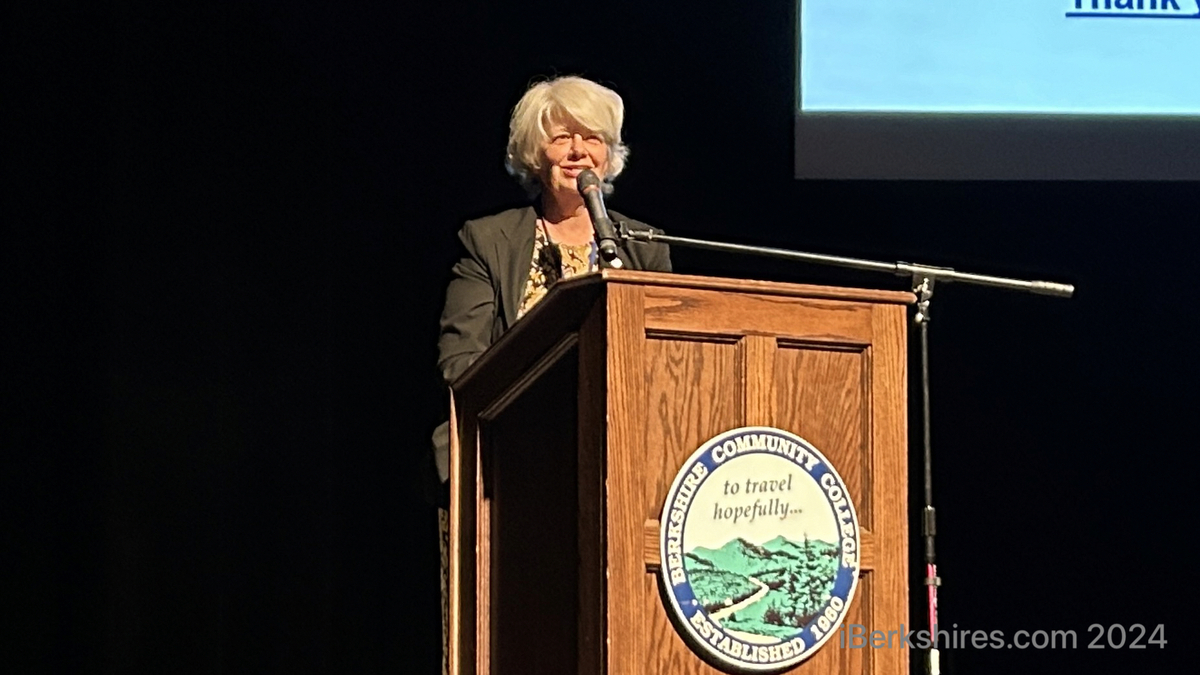
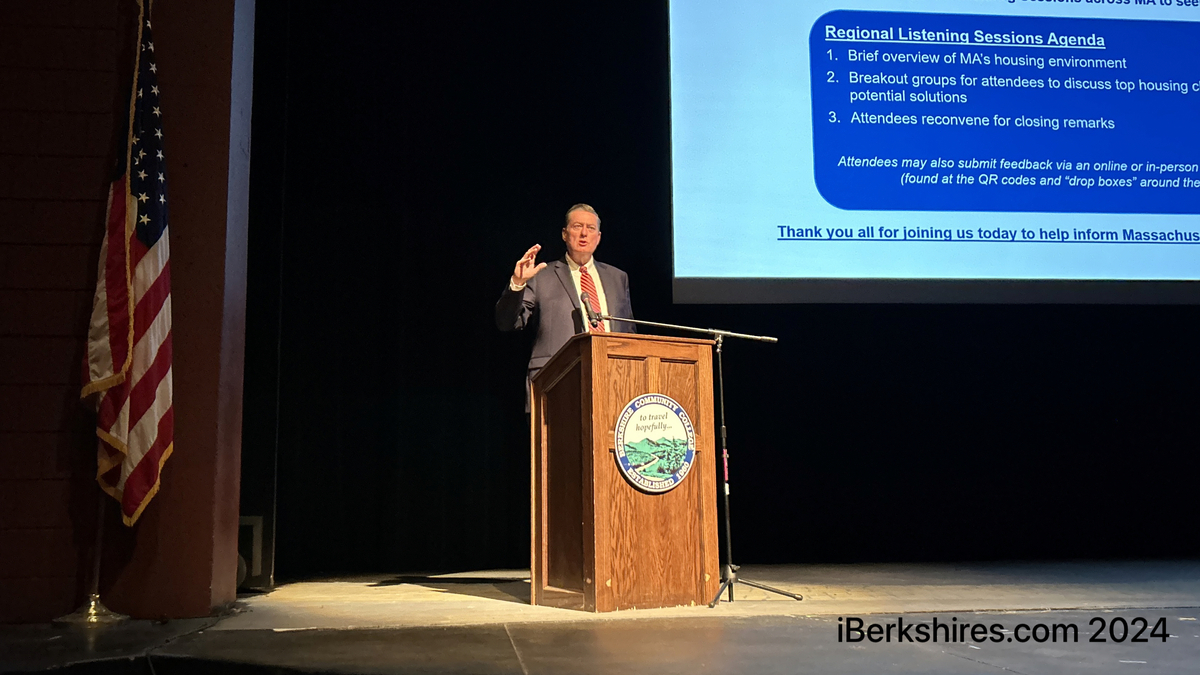
Berkshire Housing Woes Heard at State Listening Session

PITTSFIELD, Mass. — Affordability, transportation, incentives, and equity were identified as vital areas related to housing development in the Berkshires during a listening session on Wednesday to inform Gov. Maura Healey's plans to address the housing crisis.
Around 100 local officials, business and community leaders and residents attended the session that will help fuel the state's five-year housing plan. They heard from Secretary of Housing and Livable Communities Edward Augustus Jr. about the Healey-Driscoll administration's efforts and then broke into group discussions on the Berkshire Community College campus.
"It is a plan that is for the entire commonwealth, not a plan that is Boston-centric or Eastern Mass-centric," said Augustus, who in the morning was talking about public housing in Adams. "And that's why we're all here today."
This was the fifth session of 14 total.
"I think many of us in this room would attest that there have been decades in which coming to Western Mass meant stopping at Springfield," BCC's President Ellen Kennedy said.
"And I think we owe so much to the Healey Driscoll administration and to Secretary Augustus that they understand the value of listening to what other people in the Berkshires have to say but also to our commitment to trying to find ways to address it and every one of us has a different perspective and a different way that we can contribute to this conversation."
The top areas of focus were identified during one of the breakout sessions. Participants posted answers on whiteboard with two asking "What is your dream for housing in Massachusetts?" and "What potential solutions and strategies would you like MA to explore in the Statewide Housing Plan?"
Sheila Irvin, Pittsfield delegate on the Berkshire Regional Planning Commission, would like to see stable, secure, and connected communities.
"People wind up in places where they are isolated," she said. "Part of having a home is being part of a neighborhood or community where people come together for a common goal."
Leigh Davis, vice chair of the Great Barrington Select Board, said there is an increasing feeling of isolation and lack of connection and that housing can bring people together. She referenced the senior population, who may need or want to downsize but have no viable options due to price and availability.
"So more intergenerational opportunities and co-living arrangements and looking at letting people downsize with dignity and really bringing together the feeling connection and addressing isolation," she said.
"And then with houses that they do leave, being able to refurbish them and make sure that we're caring for the housing that is existing."
"I think we need to write into our constitution that housing is a right, it's going to be guaranteed," said Kamaar Taliaferro, a member of the Pittsfield Affordable Housing Trust.
Taliaferro cited a proposal currently before the trust that is seeking $10 million from the MassHousing CommonWealth Builder Program, suggesting that proposals tied to equity require community listening sessions. The project design raised concerns from some trustees who feel it does not fit in with the vernacular of the area.
"I get to talk with the developer and I get to press them and I get to be like 'Why does this look like Tampa, Fla.? We're in Pittsfield, this is the middle of our downtown,'" he said. "But not everybody gets that opportunity."
Lenox Select Board member Marybeth Mitts also spoke about equity, asserting that there needs to be housing options for every socioeconomic level in each community.
"We should not be putting certain people in certain towns and certain neighborhoods," she said.
Residents of rural communities also detailed the struggles of providing new housing without the proper infrastructure to support it and the stigma behind affordable housing.
Jonathan Butler, president & CEO of 1Berkshire, pointed out that Pittsfield has seen great success with the Housing Development Incentive Program but it is only available in gateway cities and needs to be expanded so that other communities can be eligible.
The Statewide Housing Plan, accompanied by the proposed $4.1 billion Affordable Homes Act, recognizes housing scarcity, income inequality, geographic diversity, and the cost of construction as major drivers of the current crisis. It is touted as the first in Massachusetts for over 40 years.
The housing secretary explained that the Executive Office of Housing and Livable Communities will soon celebrate one year of being a standalone secretariat. The office was created out of cries for housing solutions across the state.
"That really was a reflection of the voices that governor and [Lt. Gov. Kim Driscoll] heard as they were campaigning two years ago around the state," he said.
"That every place they went, every audience regardless of whether it was CEOs or hospital administrators or college presidents or community-based organizations or labor unions or tenant organizations, everybody said the same thing: housing, housing, housing. That is the most pressing issue confronting various organizations and communities across Massachusetts."
Gina McLaughlin, senior adviser to the secretary, said there is a lack of supply across the United States combined with increased demand.
"There are some trends in this area around interest rates, cost of construction, labor shortages, and public resource availability that across the country are affecting everyone's ability to have an adequate supply of housing," she said. "At the same time, the commonwealth housing challenges have some uniqueness to them."
Statewide, vacancy rates are at a historic low with only 1.6 percent of units for sale or rent coupled with increased demand and restrictive zoning. The number of middle-income households has declined since the 1990s with high-income and low-income households increasing and a growing number of extremely low-income households.
"Homelessness and emergency assistance is a topic that our office spends a lot of time on. As you can imagine, we have an increased number of families and individuals experiencing homelessness and families are remaining in what is supposed to be a temporary shelter for even longer because there are there are less units available for those families to transition into," McLaughlin said.
Socio-economic and racial equity is also a part of the conversation, as the Black and Latino homeownership rate is half of the white homeownership rate.
The office found that Berkshire County residents have lower incomes than the rest of the state. This is especially true for renters, with only 21 percent earning more than $75,000 annually compared to 40 percent statewide.
Renters' cost burden is also worse, with more than one in four of these households spending more than half of their income on rent and utilities. Homeowners were also shown to struggle with housing costs, as one-quarter of owners in the county are cost-burdened, and 10 percent pay more than half of their income in mortgage and utilities.
The median sale price for single-family homes and condos in Berkshire County rose 58 percent from 2012 to 2021 and only 1.4 percent of homes are available for sale or rent. On the other hand, seasonal and vacation homes exceed 25 percent and even 50 percent in many Berkshire towns.
"We also want to think about things that are specific regionally across the state and short-term rentals and their impact is certainly high here in the Berkshires," McLaughlin said.
"The growth of short-term rentals and second homes is a significant factor in general home price and in home rental and purchase availability. Nearly 1/5 of Berkshire County homes are unavailable for year-round residents."
Augustus explained that he is often quoted saying the world is run by people who show up.
"And you all showed up today," he said. "You're going to have a disproportionate voice because you came here and you're going to be able to influence what's in this housing plan for the next five years."
Tags: housing, listening tour, state officials,















